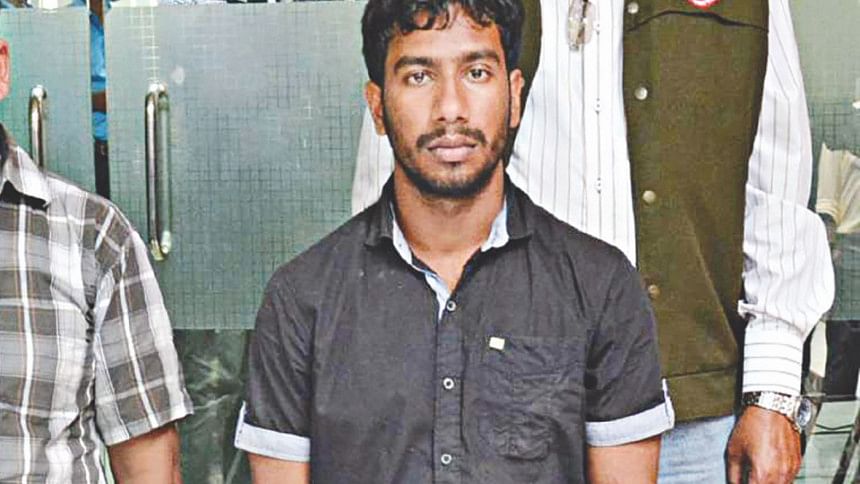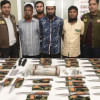August 17 Serial Blasts 2005: Out of jail, into terrorism again

Jama'atul Mujahideen Bangladesh militant Tariqul Islam Tareq was arrested in Chittagong in connection with a 2005 countrywide series bomb blast case.
A Chittagong court later sentenced him to five years in prison for the bomb attack.
He served the time and was released in 2013. On October 5, 2015, he stormed a Maddhya Badda house and hacked a spiritual leader (pir) dead. He was arrested nine days later.
The murder was carried out at a time when militants in a series of attacks killed secular bloggers, free thinkers, people of minority communities, and pirs.
Tareq had told police that he slew pir Khijir Khan, also former Power Development Board chairman, for different religious views.
Interrogating him, detectives learnt that Tareq had become more radicalised in prison when he had the company of diehard JMB militants.
This was a terrifying revelation as many of the 334 JMB militants convicted and jailed in 93 cases filed over the series bomb blasts of 2005 had been released from prisons and the authorities do not know if they had corrected themselves or had become even worse militants.
This brought into fore the fact that none of the 68 prisons in the country has any programme to de-radicalise militants.
The police could not say how many were already released but said many were about to be released.
“Since most of the cases were filed under the Explosives Substances Act and the highest punishment is 10 years' imprisonment, many of the convicts have completed their terms,” said a counterterrorism official.
Now, the counterterrorism officials are in a pickle. They have to keep an eye on them and they are not certain if they will be able to do that.
An official of Counter Terrorism and Transnational Crime (CTTC) Unit said since the formation of the unit last year, they have made a list of around 50 people to be kept under surveillance.
The list appears to be really short since 523 militant suspects of different outfits got bail on top of the many convicts now out after serving their jail terms, according to what was said at the quarterly crime conference held last month at the Police Headquarters.
Counterterrorism officials said militants would get out of jail after a certain period and the authorities need to introduce programmes in prisons to de-radicalise them and ensure vocational training so that they could reintegrate into society.
In the prisons, militants of different outfits are kept separately but members of the same organisation, both diehard and less radicalised, are kept together, which leaves room for highly radicalised militants to motivate others and strengthen their networks.
Monirul Islam, chief of the CTTC, told The Daily Star, “Most of the militants who are released from jail get involved in militancy again. What will they do? Some try to earn a living. Nobody believes them … no one gives them jobs, so they join militancy again.”
He said they would try to keep such militants under surveillance. “I cannot say for sure that we will be able to keep the militants coming out of jail under surveillance.”
International security expert Prof Rohan Gunaratna in an interview with The Daily Star in March said Bangladesh now has to move beyond the operational counter terrorism response and create a more strategic process to handle the issue.
“If you don't rehabilitate and de-radicalise them, they will pose a security threat after leaving the prisons and infect others with their ideology,” Prof Gunaratna, head of International Centre for Political Violence and Terrorism Research in Singapore, warned.
So, to prevent this from happening, the government should immediately launch a programme inside the prisons. As part of the programme, religious clerics can visit jail and use the Quran and the Hadith to counter the misinterpretation of religion by the terrorists to de-radicalise the inmates, he said.
Teachers should also be engaged to educate the inmates and re-establish their social and family connections.
They would need psychological rehabilitation to deal with their anxieties, depressions and hatred, he added. He also underscored the need for vocational trainings of the de-radicalised ones so that they could get jobs.
Inspector General of Prisons Brig Gen Syed Iftekhar Uddin recently told The Daily Star, “Our apprehension is that we are keeping all militants of a certain organisation together in group.” Talking to them it was assumed that only two or three out of around 50 militants were diehards. So they are being motivated inside the jail by the hardcore ones, he said.
“We need to identify the less radicalised and separate them from the diehard ones. But how can I do this as I don't have enough space inside jails,” the IG prisons added.
He said for a de-radicalisation programme, steps from the government with proper resources were needed. “It needs a coordinated effort … ,” he said.
Asked if he had sent any proposal for such an effort, he said he often shares his views with agencies like the DGFI but none have yet come up with ways to go forward with this.
According to jail sources around 750 militants are in 68 jails across the country and 41 of them are on death rows.
Today is the 12th anniversary of the series bomb blast. Banned JMB on this day in 2005 carried out an orchestrated attack and exploded 459 bombs in 63 districts in just half an hour.
Following the attack, 159 cases were filed and investigators pressed charges in 149 of them accusing 1,106 militants. Final reports were placed in the rest 10 cases, said Assistant Inspector General (intelligence and special affairs) Md Moniruzzaman of Police Headquarters.
Verdicts in 93 cases have been delivered in which 334 JMB leaders and activists were convicted and 349 acquitted.
Many of the 349 acquitted were arrested later on and kept with the JMB militants in jails, said an official wishing not to be named.
Tariqul Islam Tareq on August 8 was sentenced to 20 years' imprisonment by a Tangail court in another case filed for the series bomb blast in Tangail town.

 For all latest news, follow The Daily Star's Google News channel.
For all latest news, follow The Daily Star's Google News channel. 








Comments